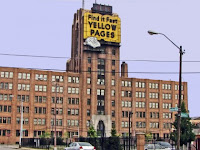The work that urban designer Toni Griffin engages in these days is very interesting, challenging and nothing short of huge and amazing! Thinking, working and organizing at this level is what it will take to renew the urban core of most American cities today. After you've read the interview, let me know your reactions. In my view, this is fascinating stuff.
Can This Planner Save Detroit?
Toni L. Griffin has just accepted a unique—and daunting—job: the reshaping of Detroit. She talks to
ARCHITECT about population decline, urban ag, downtown’s revival, and more.
By: Fred A. Bernstein
Time magazine called Toni L. Griffin a “star urban planner,” which doesn’t have quite the same ring as “starchitect,” but properly describes the 46-year-old. A graduate of the University of Notre Dame and a Loeb Fellow at Harvard University’s Graduate School of Design, where she still teaches, Griffin began her career in the private sector, working first for Skidmore, Owings & Merrill (SOM) in her native Chicago. While at SOM, she helped turn the Renaissance Center, John Portman’s office and hotel complex in downtown Detroit, into General Motors Co.’s world headquarters.
From SOM, she went to work for the Upper Manhattan Empowerment Zone Development Corporation, focusing on planning and heritage tourism initiatives, and then to the Washington, D.C., planning office, where she oversaw redevelopment projects. From Washington, she moved to Newark, N.J., where, within three years, the planning office she rebuilt was winning awards—among them, an award from the New Jersey chapter of the American Planning Association for its work on sustainable infill housing guidelines.
This spring, Griffin signed on for what may be America’s toughest urban planning challenge: helping to remake Detroit, a city that has seen its population decline by half over 60 years. In September, Griffin helped Mayor Dave Bing’s administration launch the Detroit Works Project, a 12- to 18-month effort to map the city’s future. It began with a series of widely attended public forums.
A Manhattan resident, Griffin spends most of the week in an office in Detroit City Hall. In an arrangement that reflects the strong interest of philanthropists in Detroit’s future, her salary is paid by the Kresge Foundation (which has an endowment of over $3 billion). Rip Rapson, Kresge’s president and son of architect Ralph Rapson, is also giving the city funds for Griffin to hire a team of local, national, and international consultants, from the private sector and four Michigan universities. Several other foundations are expected to provide funding to support both the technical and civic engagement components of the project.
Author Fred A. Bernstein first met Griffin in 2004, when they were both participants in the Mayors’ Institute on City Design in Charleston, S.C. She spoke to him on a recent weekend from her apartment in Harlem.
How did the Detroit job come about?
When Mayor Bing began his first full term in January, leaders of the private sector were determined to help him tackle the extraordinary challenges facing Detroit. At the same time, Kresge and other foundations wanted to make sure their investments aligned with the city’s needs, both programmatically and spatially.
This leadership saw now as the opportunity create a shared vision for the city, across sectors and inclusive of broad civic engagement. I was asked to join the mayor’s team to assemble and manage a team to create this vision with members of his staff.
To read the entire interview
click here.


























